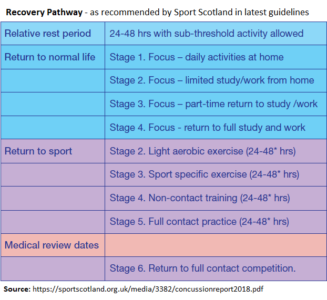Medical Director’s Blog – Concussion: Teachers have an important role to play
Updated January 2020
in 2018, Scotland Sport released new guidance on the management of concussion (click here) – an update that can be applauded for a number of reasons. Firstly, the fact that a country has produced guidelines that are applicable to all sports – something that I have previously discussed the relevance of (see Concussion: It’s Not a Rugby Injury). And secondly, because there is a far stronger focus on returning to “normal activity” – which for children includes returning to the classroom – before returning to sport.
Involvement of academic staff
This is something we at Return2Play have been talking about for a while. We advise our partner schools to engage all staff in education, not just the sports department, and to make sure teachers are informed when one of their pupils sustains a concussion. Part of this is because there are clearly benefits of everyone having increased awareness – concussions don’t only occur on the sports field – but also because teachers have an important role to play in recovery.
Children struggling through
When our doctors see children in clinic who are still suffering symptoms a few weeks after a concussion the story is often the same. They had concussion but symptoms weren’t too bad so they went to school the next day. They didn’t feel great but struggled through. The next day the same again but slightly worse and so on and so on. Often these are low severity symptoms, but significant ones -particularly in terms of impact on learning – such as headaches, difficulty concentrating, a “fogginess”. Kids aren’t good at flagging these symptoms – sometimes they haven’t even realised they are linked to the concussion – so teachers (as well as parents, of course) have a hugely important role to play in recognising the issues early. The earlier it is recognised; the earlier interventions can be put in place; the better the outcome will be.
Graduated Return to Learn
It seems obvious really. On your route to returning to sport, the first step is returning to normal life. We happily prescribe a gradual return to sport so why would we not prescribe a gradual return to learning? It is this that Sport Scotland have tried to do in their guidelines (see below). It may not be perfect, and it may not suit every child, but the principle is certainly right and it’s an excellent start.

Change in mindset
We’ve come a long way in a relatively short period of time when it comes to our understanding of concussion, our acknowledgment of the risks, and our implementation of guidelines. This has been led by the sporting world and, understandably, the initial focus was “how can we safely get people back to sport?”. In the majority of settings this is now being done well and so it is right that a slight refocus should happen so that we look more closely at how we maximise people’s recovery away from sport.
We now accept that, after a concussion, missing a few weeks of sport is in the long-term interest of the player. But the same theory should be applied to the classroom. Missing a few days of school to allow optimum recovery and a quick return to full academic ability is in the interest of all.
To read the other blogs in the concussion series, please follow the links below.
Concussion: There’s no recovery fast track
Concussion: It’s not a rugby injury
